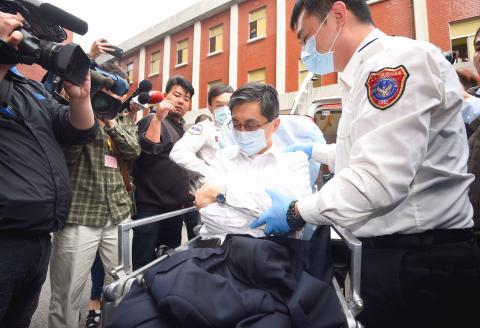Environmental Protection Administration (EPA) Minister Wei Kuo-yen (魏國彥), who on Wednesday tendered his resignation over an oil spill incident, was hospitalized yesterday after suffering from a heart condition during a question-and-answer session at the Legislative Yuan in Taipei.
Shortly after a meeting of the Legislative Yuan’s Social Welfare and Environmental Hygiene Committee began, Wei started experiencing chest tightness and the condition persisted after he took medication, so he went to the Legislative Yuan’s infirmary, National Taiwan University Hospital said.
Wei showed abnormal electrocardiogram readings and was diagnosed with acute coronary syndrome and suspected acute myocardial infarction, and was immediately transported to the hospital.

Photo: Lo Pei-der, Taipei Times
The hospital said that Wei had a history of heart disease and was conscious upon arriving at the hospital, adding that he was taken to the intensive care unit for suspected acute coronary syndrome.
A cardiac catheterization was performed in the afternoon, and it would take a few days for Wei to recover, the EPA said.
According to EPA staff, Wei has been working overtime lately because of two ships running aground in Penghu County and New Taipei City’s Shimen District (石門), which resulted in an oil spill and sparked criticism of the EPA’s handling of the incidents.
Wei on Wednesday tendered his resignation after a legislative hearing, in which Democratic Progressive Party Legislator Liu Chien-kuo (劉建國) criticized the EPA’s management of the grounded container ship off Shimen, as the oil leaking from the vessel polluted the coastline.
Wei said he was resigning to take responsibility for the pollution, rather than acting on impulse, but added that he would continue to attend legislative sessions until the premier accepts his resignation.
“As the legislature has lost confidence in the EPA’s capabilities, I have no reason to stay at the position; I am stepping down to shoulder political responsibility,” he said.
Premier Simon Chang (張善政) yesterday visited Wei at the hospital, saying that he would not accept Wei’s resignation since the minister has duly performed his duty over the grounding incidents.
Meanwhile, the EPA’s Department of Water Quality director Yeh Chun-hung (葉俊宏) said that crews have removed two-thirds of the diesel and crude oil on the container ship, and the pumping operation is expected to be finished today at the earliest.
Lubricating oils remaining on the ship would be drained later, while there is no sign that hazardous chemicals stored in nine containers on the ship would leak, Yeh said.
The Minister of Transportation and Communications said it requested the ship owner to remove all 385 containers from the ship before the flood season.

AGING: As of last month, people aged 65 or older accounted for 20.06 percent of the total population and the number of couples who got married fell by 18,685 from 2024 Taiwan has surpassed South Korea as the country least willing to have children, with an annual crude birthrate of 4.62 per 1,000 people, Ministry of the Interior data showed yesterday. The nation was previously ranked the second-lowest country in terms of total fertility rate, or the average number of children a woman has in her lifetime. However, South Korea’s fertility rate began to recover from 2023, with total fertility rate rising from 0.72 and estimated to reach 0.82 to 0.85 by last year, and the crude birthrate projected at 6.7 per 1,000 people. Japan’s crude birthrate was projected to fall below six,

US President Donald Trump in an interview with the New York Times published on Thursday said that “it’s up to” Chinese President Xi Jinping (習近平) what China does on Taiwan, but that he would be “very unhappy” with a change in the “status quo.” “He [Xi] considers it to be a part of China, and that’s up to him what he’s going to be doing, but I’ve expressed to him that I would be very unhappy if he did that, and I don’t think he’ll do that. I hope he doesn’t do that,” Trump said. Trump made the comments in the context

SELF-DEFENSE: Tokyo has accelerated its spending goal and its defense minister said the nation needs to discuss whether it should develop nuclear-powered submarines China is ramping up objections to what it sees as Japan’s desire to acquire nuclear weapons, despite Tokyo’s longstanding renunciation of such arms, deepening another fissure in the two neighbors’ increasingly tense ties. In what appears to be a concerted effort, China’s foreign and defense ministries issued statements on Thursday condemning alleged remilitarism efforts by Tokyo. The remarks came as two of the country’s top think tanks jointly issued a 29-page report framing actions by “right-wing forces” in Japan as posing a “serious threat” to world peace. While that report did not define “right-wing forces,” the Chinese Ministry of Foreign Affairs was

PREPAREDNESS: Given the difficulty of importing ammunition during wartime, the Ministry of National Defense said it would prioritize ‘coproduction’ partnerships A newly formed unit of the Marine Corps tasked with land-based security operations has recently replaced its aging, domestically produced rifles with more advanced, US-made M4A1 rifles, a source said yesterday. The unnamed source familiar with the matter said the First Security Battalion of the Marine Corps’ Air Defense and Base Guard Group has replaced its older T65K2 rifles, which have been in service since the late 1980s, with the newly received M4A1s. The source did not say exactly when the upgrade took place or how many M4A1s were issued to the battalion. The confirmation came after Chinese-language media reported